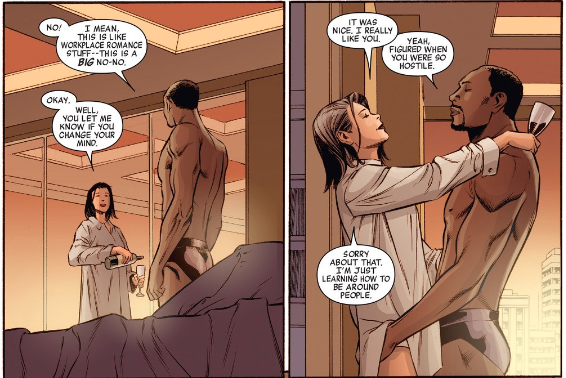Superhero comics deal in extremes: Characters overreact, the world is in constant jeopardy, and the solution almost always involves physical combat. So maybe I shouldn't have been surprised when the #FireRickRemender fiasco erupted. There was no conversation. Instead, people hurled accusations and argued over whether a writer should keep his job, while others mocked the whole thing. The rest of us silently watched from the sidelines, and that was pretty much it: That was how comics professionals, fans and industry observers handled a three-page scene from Captain America #22.
I guess I should be happy that people are so passionate about these stories and the creators behind them. If we were all so blasé and detached, sales would probably not just be flat so far this year, they'd be in the gutters. Yet I can't help but feel disappointed, because I know we can do better than this.
Jackie, who created the #FireRickRemender hashtag, is a longtime Captain America fan. She knows the history of the character, his supporting cast, and the related comics way better than I ever will. She's invested in the character and is willing to voice criticism if she doesn't like something. Every fan has that right, but there are ways to express dissatisfaction that don't include labeling someone as "a racist, sexist, ableist bastard" or calling for a writer to be fired (for which she apologized). She does have some legitimate points worth discussing, but they were completely drowned out by hyperbole. name-calling and a crusade for a pink slip. Now, we all rant in private and say things we might not elsewhere -- and it's her Tumblr, where she's free to write whatever she wants for anyone to read. However, if the goal is to get a response from Marvel, fans should consider a reasonable tone for a reasonable reply. If the goal is simply to rattle cages and entrench "the other side,' then by all means, don't tone it down.
At the same time, comics professionals also have a responsibility. Remender had a questionable response to some reader complaints a year ago, flippantly advising unhappy fans to "drown yourself [in] hobo piss." Although he apologized, those kinds of interactions are embarrassing and no doubt only serve help to further enrage unhappy fans. It makes it easier for them dig in and vilify the people creating the stories. Again, if creators want fans to approach them reasonably, they should communicate reasonably; it's a two-way street. Unfortunately, more burden is on the creators and editors due to the sheer numbers of readers. It's easy to group fans into buckets of haters, fans and so forth, but each interaction is unique to that person, even though it may feel like one protracted, frustrating conversation with a single, tireless entity. The crass and angry responses do nothing but make the creator feel better for about five seconds before the inevitable tidal wave of even angrier messages comes crashing in.
Another element complicating this is the anonymity of the Internet. Jackie uses her first name, but certainly on Tumblr and other social-media platforms, it's not difficult to hide behind a fake handle, or, through Tumblr's ask feature, to be completely anonymous (as Marvel's Tom Brevoort discovers every day). This is nothing new, but it remains a challenge. Again, if fans want an open dialogue, they need to rethink their approach. Two real people talking to each other produces different results.
Of course, having a conversation doesn't always mean we get what we want. Remender and Jackie could sit down together in a room, have a conversation that's both spirited and respectful, yet still walk away changing nothing. At the end of the day, we have to realize we may change nobody, but that doesn't give us permission to revert into obnoxious jerks.
I don't expect us to start holding hands in unified bliss, but at least some of us have to do better than we did in the past couple of weeks. There are people on Twitter and Tumblr still debating this, insisting they acted reasonably or refusing to concede an inch to "the other side." As long as there's this creator vs. fan polarity that immediately jumps to extremes, we'll never hear each other.

